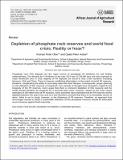| dc.contributor.author | Kisinyo Peter Oloo and Opala Peter Asbon | |
| dc.date.accessioned | 2022-01-21T13:20:54Z | |
| dc.date.available | 2022-01-21T13:20:54Z | |
| dc.date.issued | 2020 | |
| dc.identifier.issn | : 1991-637X | |
| dc.identifier.uri | https://repository.maseno.ac.ke/handle/123456789/4472 | |
| dc.description | Vol. 16(9), pp. 1223-1227, September, 2020
Url:http://www.academicjournals.org/AJAR | en_US |
| dc.description.abstract | Phosphate rock (PR) deposits are the major source of phosphate (P) fertilizers for soil fertility
replenishment. The demand for P fertilizers in the year 2014 was 42,706,000 tons and was expected to
reach 46,648,000 tons in 2018. Majority of PR deposits are found in only a few countries including
Morocco, USA and China. There is however conflicting information on the extent of world PR reserves,
therefore, complicating the ability to accurately determine their lifespan. Consequently, proper planning
on the utilization of this resource is hampered. Two schools of thought have emerged in regard to the
longevity of the PR reserves. Some argue that there is imminent depletion of this resource and the
world should therefore be prepared for a looming food crisis. However, based on the most recent
estimates of 290 billion tons of PR reserves, some scientists have predicted that the PR reserves will be
depleted between the years 2311 and 2411 and therefore conclude that there is no immediate course of
alarm. What is not in doubt, however, is the finiteness of PR reserves. Therefore, an approach that
encourages society to adopt a sustainable utilization of this phosphate resource should be advocated
as an insurance against food insecurity. | en_US |
| dc.publisher | African Journal of Agricultural Research | en_US |
| dc.subject | Food security, phosphate rock depletion, sustainable agriculture. | en_US |
| dc.title | Depletion of phosphate rock reserves and world food crisis: Reality or hoax? | en_US |
| dc.type | Article | en_US |

